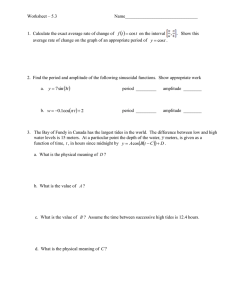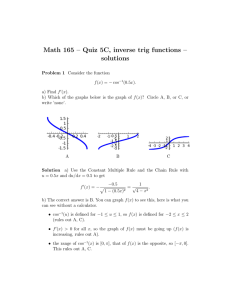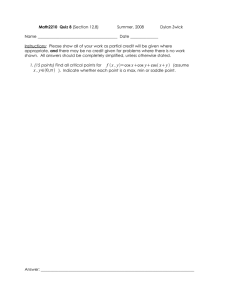Lecture 20 SHM So Far Velocity: v(t) =
advertisement
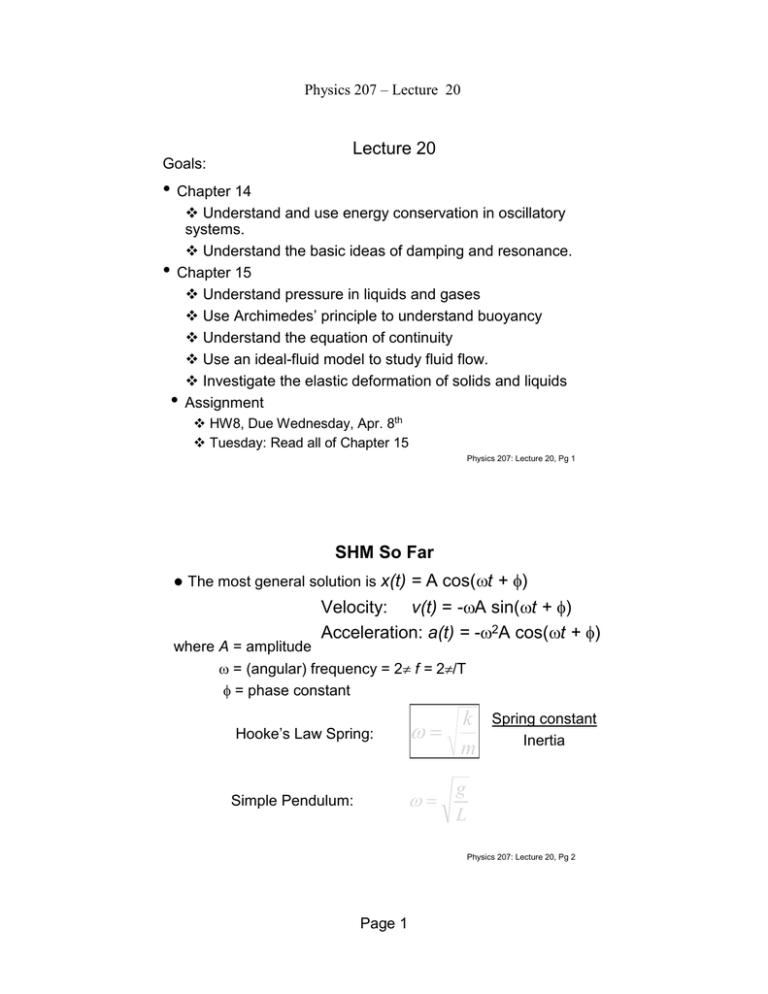
Physics 207 – Lecture 20 Lecture 20 Goals: • Chapter 14 Understand and use energy conservation in oscillatory systems. Understand the basic ideas of damping and resonance. • Chapter 15 Understand pressure in liquids and gases Use Archimedes’ principle to understand buoyancy Understand the equation of continuity Use an ideal-fluid model to study fluid flow. Investigate the elastic deformation of solids and liquids • Assignment HW8, Due Wednesday, Apr. 8th Tuesday: Read all of Chapter 15 Physics 207: Lecture 20, Pg 1 SHM So Far The most general solution is x(t) = A cos(ωt + φ) Velocity: v(t) = -ωA sin(ωt + φ) Acceleration: a(t) = -ω2A cos(ωt + φ) where A = amplitude ω = (angular) frequency = 2π f = 2π/T φ = phase constant Hooke’s Law Spring: ω= k m Simple Pendulum: ω= g L Spring constant Inertia Physics 207: Lecture 20, Pg 2 Page 1 Physics 207 – Lecture 20 SHM So Far The most general solution is x(t) = A cos(ωt + φ) Velocity: v(t) = -ωA sin(ωt + φ) Acceleration: a(t) = -ω2A cos(ωt + φ) where A = amplitude ω = (angular) frequency = 2π f = 2π/T φ = phase constant x(t) Here φ = 0 T = 2π/ω A −π/ω −π/ω A π/ω 2π π/ω time Physics 207: Lecture 20, Pg 3 SHM So Far For SHM without friction The frequency does not depend on the amplitude ! The oscillation occurs around the equilibrium point where the force is zero! Mechanical Energy is constant, it transfers between potential and kinetic energies. Physics 207: Lecture 20, Pg 4 Page 2 Physics 207 – Lecture 20 The shaker cart You stand inside a small cart attached to a heavy-duty spring, the spring is compressed and released, and you shake back and forth, attempting to maintain your balance. Note that there is also a sandbag in the cart with you. At the instant you pass through the equilibrium position of the spring, you drop the sandbag out of the cart onto the ground. What effect does jettisoning the sandbag at the equilibrium position have on the amplitude of your oscillation? A. It increases the amplitude. B. It decreases the amplitude. C. It has no effect on the amplitude. Hint: At equilibrium, both the cart and the bag are moving at their maximum speed. By dropping the bag at this point, energy (specifically the kinetic energy of the bag) is lost from the spring-cart system. Thus, both the elastic potential energy at maximum displacement and the kinetic energy at equilibrium must decrease Physics 207: Lecture 20, Pg 5 The shaker cart Instead of dropping the sandbag as you pass through equilibrium, you decide to drop the sandbag when the cart is at its maximum distance from equilibrium. What effect does jettisoning the sandbag at the cart’s maximum distance from equilibrium have on the amplitude of your oscillation? A. It increases the amplitude. B. It decreases the amplitude. C. It has no effect on the amplitude. Hint: Dropping the bag at maximum distance from equilibrium, both the cart and the bag are at rest. By dropping the bag at this point, no energy is lost from the spring-cart system. Therefore, both the elastic potential energy at maximum displacement and the kinetic energy at equilibrium must remain constant. Physics 207: Lecture 20, Pg 6 Page 3 Physics 207 – Lecture 20 The shaker cart What effect does jettisoning the sandbag at the cart’s maximum distance from equilibrium have on the maximum speed of the cart? A. It increases the maximum speed. B. It decreases the maximum speed. C. It has no effect on the maximum speed. Hint: Dropping the bag at maximum distance from equilibrium, both the cart and the bag are at rest. By dropping the bag at this point, no energy is lost from the spring-cart system. Therefore, both the elastic potential energy at maximum displacement and the kinetic energy at equilibrium must remain constant. Physics 207: Lecture 20, Pg 7 What about Vertical Springs? For a vertical spring, if y is measured from the equilibrium position 1 U = ky 2 2 Recall: force of the spring is the negative derivative of this function: FNET = − j k dU = −ky dy This will be just like the horizontal case: d2y -ky = ma = m dt 2 y=0 m Which has solution y(t) = A cos( ωt + φ) where ω = F= -ky k m Physics 207: Lecture 20, Pg 8 Page 4 Physics 207 – Lecture 20 Exercise Simple Harmonic Motion A mass oscillates up & down on a spring. It’s position as a function of time is shown below. At which of the points shown does the mass have positive velocity and negative acceleration ? Remember: velocity is slope and acceleration is the curvature y(t) = A cos( ωt + φ) v(t) = -A ω sin( ωt + φ) y(t) a(t) = -A ω2 cos( ωt + φ) (a) (c) t (b) Physics 207: Lecture 20, Pg 9 Home Exercise A mass m = 2 kg on a spring oscillates (no friction) with amplitude A = 10 cm. At t = 0 its speed is at a maximum, and is v=+2 m/s What is the angular frequency of oscillation ω ? What is the spring constant k ? General relationships E = K + U = constant, ω = (k/m)½ So at maximum speed U=0 and ½ mv2 = E = ½ kA 2 thus k = mv2/A2 = 2 x (2) 2/(0.1)2 = 800 N/m, ω = 20 rad / sec k m x Physics 207: Lecture 20, Pg 10 Page 5 Physics 207 – Lecture 20 Home Exercise Initial Conditions A mass hanging from a vertical spring is lifted a distance d above equilibrium and released at t = 0. Which of the following describe its velocity and acceleration as a function of time (upwards is positive y direction)? (A) v(t) = - vmax sin( ωt ) a(t) = -amax cos( ωt ) (B) v(t) = vmax sin( ωt ) a(t) = amax cos( ωt ) (C) v(t) = vmax cos( ωt ) a(t) = -amax cos(ωt ) k y m t=0 d 0 (both vmax and amax are positive numbers) Physics 207: Lecture 20, Pg 11 Home Exercise Initial Conditions A mass hanging from a vertical spring is lifted a distance d above equilibrium and released at t = 0. Which of the following describe its velocity and acceleration as a function of time (upwards is positive y direction): (A) v(t) = - vmax sin( ωt ) (B) v(t) = vmax sin( ωt ) (C) v(t) = vmax cos( ωt ) a(t) = -amax cos( ωt ) a(t) = amax cos( ωt ) t=0 a(t) = -amax cos(ωt ) k y m d 0 (both vmax and amax are positive numbers) Physics 207: Lecture 20, Pg 12 Page 6 Physics 207 – Lecture 20 Exercise Simple Harmonic Motion You are sitting on a swing. A friend gives you a small push and you start swinging back & forth with period T1. Suppose you were standing on the swing rather than sitting. When given a small push you start swinging back & forth with period T2. Which of the following is true recalling that ω = (g / L)½ (A) T1 = T2 (B) T1 > T2 (C) T1 < T2 T1 T2 Physics 207: Lecture 20, Pg 13 Exercise Simple Harmonic Motion You are sitting on a swing. A friend gives you a small push and you start swinging back & forth with period T1. Suppose you were standing on the swing rather than sitting. When given a small push you start swinging back & forth with period T2. If you are standing, the center of mass moves towards the pivot point and so L is less, ω is bigger, T2 is smaller (A) T1 = T2 (B) T1 > T2 (C) T1 < T2 Physics 207: Lecture 20, Pg 14 Page 7 Physics 207 – Lecture 20 Energy in SHM For both the spring and the pendulum, we can derive the SHM solution using energy conservation. The total energy (K + U) of a system undergoing SMH will always be constant! U E K U -A This is not surprising since there are only conservative forces present, hence energy is conserved. 0 A x Physics 207: Lecture 20, Pg 15 SHM and quadratic potentials SHM will occur whenever the potential is quadratic. For small oscillations this will be true: For example, the potential between H atoms in an H2 molecule looks something like this: U E U x K U -A 0 A x Physics 207: Lecture 20, Pg 16 Page 8 Physics 207 – Lecture 20 SHM and quadratic potentials Curvature reflects the spring constant or modulus (i.e., stress vs. strain or force vs. displacement) U x Measuring modular proteins with an AFM See: http://hansmalab.physics.ucsb.edu Physics 207: Lecture 20, Pg 17 What about Friction? A velocity dependent drag force (A model) d 2 x b dx k + + x=0 dt 2 m dt m dx d 2x − kx − b = m 2 dt dt We can guess at a new solution. x (t ) = A exp ( − 2btm ) cos (ω t + φ ) and now ω02 k / m Note 2 With, k b b 2 ω= − = ωo − m 2m 2m 2 Physics 207: Lecture 20, Pg 18 Page 9 Physics 207 – Lecture 20 What about Friction? A damped exponential x (t ) = A exp ( − b t ) cos (ω t + φ ) 2m if ωo > b / 2 m 1.2 1 0.8 0.6 0.4 A 0.2 0 -0.2 -0.4 -0.6 -0.8 -1 ωt Physics 207: Lecture 20, Pg 19 Variations in the damping Small damping time constant (m/b) Low friction coefficient, b << 2m Moderate damping time constant (m/b) Moderate friction coefficient (b < 2m) Physics 207: Lecture 20, Pg 20 Page 10 Physics 207 – Lecture 20 Damped Simple Harmonic Motion ω = ωo2 − (b / 2m) 2 A downward shift in the angular frequency There are three mathematically distinct regimes ωo > b / 2 m underdamped ωo = b / 2m critically damped ωo < b / 2 m overdamped Physics 207: Lecture 20, Pg 21 Exercise Damped oscillations: A can of coke is attached to a spring and is displaced by hand (m = 0.25 kg & k = 25.0 N/m) The coke can is released, and it starts oscillating with an amplitude of A = 0.3 m. How damped is the system? A. Underdamped (multiple oscillations with an exponential decay in amplitude) B. Critically damped (simple decaying motion with at most one overshoot of the system's resting position) C. Overdamped (simple exponentially decaying motion, without any oscillations) Physics 207: Lecture 20, Pg 22 Page 11 Physics 207 – Lecture 20 Driven SHM with Resistance Apply a sinusoidal force, F0 cos (ωt), and now consider what A and b do, steady state amplitude d 2 x b dx k F + + x = cos ω t dt 2 m dt m m A= b/m small Not Zero!!! F0 / m (ω 2 − ω 02 ) 2 + ( bω 2 ) m b/m middling b large ω ≅ ω0 ω Physics 207: Lecture 20, Pg 23 Resonance-based DNA detection with nanoparticle probes Change the mass of the cantilever & change the resonant frequency Su et al., APL 82: 3562 (2003) Physics 207: Lecture 20, Pg 24 Page 12 Physics 207 – Lecture 20 Stick - Slip Friction How can a constant motion produce resonant vibrations? Examples: Strings, e.g. violin Singing / Whistling Tacoma Narrows Bridge … Physics 207: Lecture 20, Pg 25 Dramatic example of resonance In 1940, a steady wind set up a torsional vibration in the Tacoma Narrows Bridge Physics 207: Lecture 20, Pg 26 Page 13 Physics 207 – Lecture 20 A short clip In 1940, a steady wind sets up a torsional vibration in the Tacoma Narrows Bridge Physics 207: Lecture 20, Pg 27 Dramatic example of resonance Eventually it collapsed Physics 207: Lecture 20, Pg 28 Page 14 Physics 207 – Lecture 20 Exercise Resonant Motion Consider the following set of pendulums all attached to the same string B C D A If I start bob D swinging which of the others will gain the most mechanical energy (assuming virtually no friction) ? (A) (B) (C) Physics 207: Lecture 20, Pg 29 Chapter 15, Fluids This is an actual photo of an iceberg, taken by a rig manager for Global Marine Drilling in St. Johns, Newfoundland. The water was calm and the sun was almost directly overhead so that the diver Physics 207: Lecture 20, Pg 30 Page 15 Physics 207 – Lecture 20 Fluids (Ch. 15) At ordinary temperature, matter exists in one of three states Solid - has a shape and forms a surface Liquid - has no shape but forms a surface Gas - has no shape and forms no surface What do we mean by “fluids”? Fluids are “substances that flow”…. “substances that take the shape of the container” Atoms and molecules are free to move. No long range correlation between positions. Physics 207: Lecture 20, Pg 31 Fluids An intrinsic parameter of a fluid Density m ρ = V kg/m3 units : = 10-3 g/cm3 ρ(water) = 1.000 x 103 kg/m3 = 1.000 g/cm3 ρ(ice) = 0.917 x 103 kg/m3 = 0.917 g/cm3 ρ(air) = 1.29 kg/m3 = 1.29 x 10-3 g/cm3 ρ(Hg) = 13.6 x103 kg/m3 = 13.6 g/cm3 Physics 207: Lecture 20, Pg 32 Page 16 Physics 207 – Lecture 20 Fluids p= Another parameter: Pressure F A Any force exerted by a fluid is perpendicular to a surface of contact, and is proportional to the area of that surface. Force (a vector) in a fluid can be expressed in terms of pressure (a scalar) as: r F = p A nˆ n A Physics 207: Lecture 20, Pg 33 What is the SI unit of pressure? A. Pascal B. Atmosphere C. Bernoulli D. Young E. p.s.i. Units : 1 N/m2 1 bar 1 mbar 1 torr = 1 Pa (Pascal) = 105 Pa = 102 Pa = 133.3 Pa 1 atm = 1.013 x105 Pa = 1013 mbar = 760 Torr = 14.7 lb/ in2 (=PSI) Physics 207: Lecture 20, Pg 34 Page 17 Physics 207 – Lecture 20 Pressure vs. Depth Incompressible Fluids (liquids) When the pressure is much less than the bulk modulus of the fluid, we treat the density as constant independent of pressure: incompressible fluid p 0 y1 F1 y2 p 1 A p 2 mg F2 For an incompressible fluid, the density is the same everywhere, but the pressure is NOT! p(y) = p0 - y g ρ Gauge pressure (subtract p0) F2 = F1+ m g = F1+ ρVg F2 /A = F1/A + ρVg/A p2 = p1 - ρg y Physics 207: Lecture 20, Pg 35 Lecture 20 • Assignment HW8, Due Wednesday, Apr. 8th Tuesday: Read all of Chapter 15 Physics 207: Lecture 20, Pg 36 Page 18
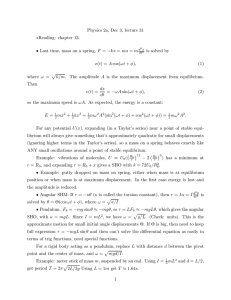
![ ]. ) /](http://s2.studylib.net/store/data/015834125_1-06c22f0bdc3e34adb72b4710444befe7-300x300.png)
